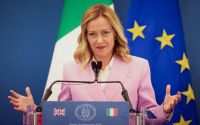The children of new immigrants coming to Britain should not immediately be allowed to attend state schools, Nigel Farage has suggested. The Ukip leader made the comments when asked about a policy on the party’s website saying immigrants and their dependants would need private education for five years after entering the UK.
Farage said it was a “difficult” issue and that it was not a manifesto pledge. But he said his personal view was that immigrants would only bring their dependants after a period of time and after that he would not envisage their children being allowed to go straight into state schools.
The What We Stand For section of Ukip’s website says: “Immigrants must financially support themselves and their dependants for five years. This means private health insurance (except emergency medical care), education and housing – they should pay into the pot before they take out of it.”
Asked how that would work and whether it could in fact lead to more segregation in schools, Farage said: “Basically, people would bring dependants, not immediately. They would bring them after a period of time. I think the most important thing is that those that come do have healthcare. That’s really, really important, and on the life-threatening disease stuff, that’s perfectly clear ... The dependants thing is much more difficult. But I wouldn’t foresee people coming into Britain immediately being allowed to bring children to go through the state system. Except for very high earners, it wouldn’t be very relevant.”
Ukip supports a five-year ban on unskilled migrants coming to Britain and allowing highly-skilled people to enter only if they have enough “points” under an Australian-style border control system.
Pressed on whether he was saying that even highly skilled people would not be bringing their families with them, Farage said: “Not to begin with. Sometimes they do. If I got a work permit in America for two years and I went with my family, I would have to pay for education and health.”
Asked whether Ukip would want to replicate that system, whereby immigrants would have to pay for both private education and health, Farage said: “To be honest, most countries in the world do. This is not unusual.”
Concerns about the impact of immigration on the school system have previously been highlighted by senior Conservatives and Sir Michael Wilshaw, the Ofsted child inspector.
Farage outlined his views in an interview with the Guardian and Mirror Online on a wide range of issues, from immigration to the party’s election strategy to the possibility of a Tory-Ukip deal after 7 May. He said the party’s stance on immigration was proving to be the strongest argument for Ukip on the doorstep “without any shadow of a doubt”, even more so than its campaign for an EU referendum.
“I think we’re going to talk about a range of things, but I think it is absolutely a key issue and I think the others have now decided not to talk about it,” he said. “Which in many ways makes my life a lot easier. A lot easier. They will talk about NHS, they will talk about the economy and try and claim both of those issues as their own. So I think they’ve made it easy for us.”
Ukip is trying to frame the immigration debate to appeal to potential voters from the left as well as the right, arguing that it has created a downward pressure on wages and harmed the prospects of the poorest in society. Farage said immigration has been “fantastic, wonderful” for the rich and it has now “gone back to Downton Abbey in some parts of the country”. “If you employ chauffeurs, and nannies and gardeners, then the eastern European opening of the doors has been great. I never said it was bad for everybody,” he added.
Farage also explained the party’s options in the case of either a Tory- or Labour-led government. Speaking to the Sunday Telegraph over the weekend, he confirmed that Ukip could prop up a Conservative-led government if David Cameron agrees to hold an EU referendum this year and under certain conditions. Even if Britain voted to stay in the EU, Ukip would not be dead as a political force – “Just look at the SNP.”
He denied that the election of Boris Johnson as Tory leader would present a problem for Ukip, as he believes the London mayor is even more pro-immigration and pro-EU than the prime minister.
The Ukip leader has said he believes Cameron will win the election – a claim that may be designed to neutralise the worries among potential Ukip voters about the possibility of a Miliband government. However, Farage said that from the point of view of a cynic who wanted to see the growth of Ukip, a Miliband-SNP deal would be a “dream team”. This is because Ukip sees the biggest potential for growth in the north, taking votes from former old Labour supporters.
Ukip is unlikely to gain more than a handful of MPs at the next election, but could come second in hundreds of seats across the country, setting it up for a potentially bigger breakthrough in 2020. Asked if he would still be around in Ukip at that point, Farage said: “I think if we get a good result on 7 May, I would like to be part of Ukip’s 2020 strategy. But if I fail on 7 May, we will have to look at this differently.”
In an extract from his book, The Purple Revolution, serialised in the Daily Telegraph, Farage said he would quit as party leader if he failed to become the MP for South Thanet at the election.
“It is frankly just not credible for me to continue to lead the party without a Westminster seat,” he writes. “What credibility would Ukip have in the Commons if others had to enunciate party policy in parliament and the party leader was only allowed in as a guest?
“Was I supposed to brief Ukip policy from the Westminster Arms? No - if I fail to win South Thanet, it is curtains for me. I will have to step down.”
Source : The Guardian





